
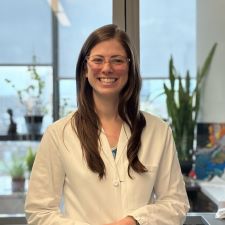
Thalidomide derivatives are a mainstay of treatment in multiple myeloma, a cancer of white blood cells called plasma cells. However, around one in ten individuals treated with thalidomide derivatives for multiple myeloma will develop a blood clot, which can be life-threatening. It is critical to determine how to continue to use thalidomide derivatives to kill myeloma cells, while working to understand why these drugs increase the likelihood of clotting. Thalidomide derivatives work by degrading proteins important to myeloma cell growth; Dr. Zon [The Mark Foundation for Cancer Research Physician-Scientist] hypothesizes that these drugs could similarly lead to the degradation of proteins that prevent blood clotting. She is comprehensively evaluating what factors promote blood clots patients with multiple myeloma, with the goal of developing more targeted medications to prevent blood clots and improve treatment outcomes in blood cancer patients.
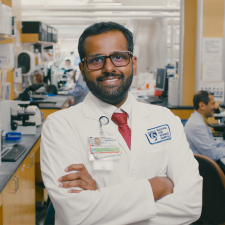
It has been long recognized that B-cell malignancies such as follicular lymphoma (FL) are dependent on interactions with nearby non-malignant cells for survival. However, this dependency has yet to be exploited therapeutically. Dr. Shanmugam aims to define the pro-tumorigenic growth factors in the environment around malignant B cells in FL and elucidate the mechanisms of how these growth factors promote FL cell survival and proliferation. This knowledge will enable the development of new treatments that block these interactions and new laboratory models of follicular lymphoma.
Chimeric antigen receptor (CAR) T cells are a type of immunotherapy that uses genetically engineered T cells from patients to treat cancer. While a one-time treatment has the potential to generate long-term protection from relapse, CAR T cells often fail due to poor persistence. Dr. Mi recently studied samples from patients with durable remissions of leukemia and found that rare persistent CAR T cells share a distinct set of molecular and cellular features. She will now define the properties of persistent CAR T cells across multiple blood cancers, trace their T cell origins and evolutionary dynamics using novel technologies, and experimentally evaluate her findings in preclinical models. These studies could illuminate how CAR T cells change over time in patients and help guide development of future cellular therapies with more durable effects for patients with different types of cancers.
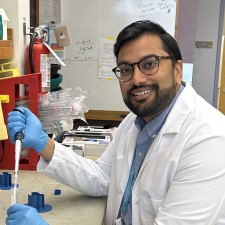
Dr. Bhansali is studying how epigenetic processes—specifically the three-dimensional folding of DNA—promote the development, growth, and survival of cancers. His research focuses on T-cell acute lymphoblastic leukemia (T-ALL), an aggressive blood cancer affecting both children and adults for which traditional chemotherapy remains the mainstay of treatment. LDB1 is a protein involved in the process of DNA folding that partners with another protein called LMO2, which is highly expressed in up to 75% of T-ALL. Dr. Bhansali hypothesizes that LDB1/LMO2 rewire the normal gene expression machinery in our blood cells in a way that activates cancer-promoting genes to cause leukemia. Targeting this process may shed light on new treatment avenues and ways to overcome resistance to treatment.
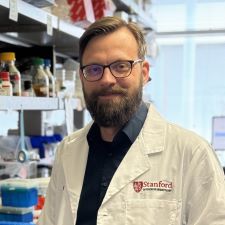
Certain cancers of the blood are treated by transplanting stem cells that can regenerate all kinds of blood cells from healthy donors. Even though this procedure has the potential to cure the cancer, common complications such as bloodstream infections or graft-versus-host disease (when the body rejects the donor cells) can lead to major side effects and even death. There is substantial evidence that these complications are linked to the microbes residing in the gut, collectively termed the gut microbiome, but the exact mechanism for this interaction is unknown. To address this knowledge gap, Dr. Wirbel will study how the genomes of gut microbes change over time in a large cohort of blood stem cell transplantation patients, using modern DNA sequencing techniques and developing novel analyses pipelines. He will then investigate whether the genes that are changing in microbial genomes might influence the human immune system and thereby contribute to these clinical complications.
Dr. Wirbel plans to develop a computational tool for the reference-free analysis of microbial genomes over time based on long-read sequencing. By comparing newly assembled genomes across different sampling time points, the tool will detect structural variation (deletion or insertions into the genome) in microbial genomes. Additionally, genomic inversions (“flipping” of the orientation of DNA) and genes associated with these changes will also be identified.

A major cause of relapse after therapy is the persistence of measurable residual disease (MRD) cells—cancer cells that remain after treatment and eventually spread. Due to technical and logistical challenges in accessing and analyzing MRD cells, the molecular and cellular pathways that enable MRD progression remain poorly understood. Dr. Bachireddy will use innovative molecular tools to analyze tissue samples from blood cancer patients at a single-cell level to unlock insights into MRD progression. Using cutting-edge machine learning approaches, he will identify immunosuppressive mechanisms that may be targeted to halt MRD progression. Beyond these blood cancers, he aims to reveal organizing principles of MRD progression that are relevant across human cancers.
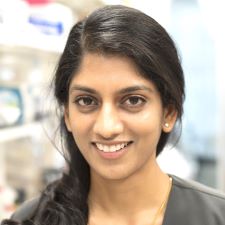
Before a gene can be expressed, a protein known as a splicing factor must remove non-coding regions (introns) from the RNA strand. Mutations in splicing factors, and specifically one called SF3B1, can lead to the development of certain blood cancers. Dr. Vallurupalli [David M. Livingston, MD, Physician-Scientist] will use genome editing technologies to generate and characterize SF3B1-mutant models in human adult blood stem cells. She will also screen for other genetic factors that may influence the outcome of SF3B1 mutations. Her goal is to identify previously unrecognized therapeutic targets for treating splicing factor-mutated blood cancers.
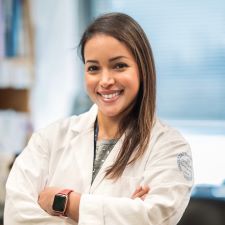
About 70% of pediatric leukemias and up to 10% of adult leukemias are caused by a genetic disruption in which the mixed lineage leukemia (MLL) 1 gene breaks off and attaches to a different chromosome. This event, known as a chromosomal translocation, gives rise to a distinct subset of leukemias called MLL-rearranged acute myeloid leukemia (AML). Studies have shown that a protein called KMT2D plays a critical role in the development of MLL-rearranged AML. However, the potential of KMT2D as a novel therapeutic target remains underexplored. Dr. Cruz [The Mark Foundation for Cancer Research Physician-Scientist] will use molecular biology, epigenetic, and biochemistry approaches to describe the precise molecular mechanism by which KMT2D regulates gene expression in MLL-rearranged AML. Her work will provide insight into potentially targetable proteins for this aggressive blood cancer.
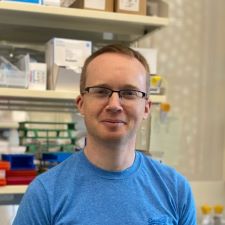
A key question in cancer biology is how genetic mutations, acquired over time, interact with environmental factors to affect emergence and progression of disease. This is particularly relevant in blood cancers because many people acquire genetic mutations in blood-forming stem cells in the bone marrow but only a small proportion go on to develop acute myeloid leukemia (AML). Dr. Swann [William Raveis Charitable Fund Fellow] is investigating whether inflammatory signals alter the behavior of stem cells that have already acquired an initial mutation, causing them to acquire features of cancer that will hasten the onset of AML. Specifically, Dr. Swann is interested in whether pre-cancerous stem cells change their gene expression in response to inflammation, which might allow them to outcompete normal cells in the bone marrow. He is utilizing cutting-edge techniques such as CRISPR editing of blood stem cells to investigate the molecular pathways responsible for these biological changes. This project has the potential to identify molecular pathways activated by inflammation that might promote AML development, offering new targets for therapeutic interventions. Dr. Swann received his VetMD (DVM) from the University of Cambridge and his DPhil (PhD) from the University of Oxford.
